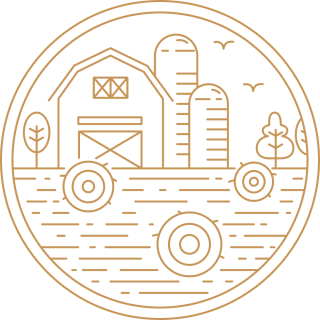Knauss legislative fellowships in Congress help build careers — and they're fun and educational. See our video and fact sheet for details.
The Coastal Farming Challenges Workshops: From the perspective of a notetaker
When I was asked if I was interested in being a notetaker for the Coastal Farming Challenges workshops hosted by Maryland Sea Grant, I immediately said yes without fully knowing what my duties entailed. And I am glad that I did. Throughout my participation in the Coastal Farming Challenges workshops, I had the opportunity to learn firsthand about the struggles that Maryland coastal farmers are facing due to the effects of climate change.
In the first workshop held last December, I learned about particular issues the farmers were experiencing. One farmer mentioned that the farm he grew up in had drastically changed over the course of his life. He talked about how parts of his family’s land have gradually become more inundated to the point where it is nearly impossible to grow crops in those parts. Sadly, that was a common theme among the participants. They have been losing cropland in part due to erosion, saltwater intrusion and flooding from high tides. Surprisingly, some of the farmers even mentioned that beavers’ dams were also affecting their lands, because the semi-aquatic mammals are attracted to the wetter conditions.
 The participants also expressed a need for accessible technical advice about best management practices and soil hydrology. In addition, they mentioned that the rules of certain available federal and state programs were confusing and also limiting in particular instances.
The participants also expressed a need for accessible technical advice about best management practices and soil hydrology. In addition, they mentioned that the rules of certain available federal and state programs were confusing and also limiting in particular instances.
The second Coastal Farming Challenges workshop was all about the coastal land management solutions. In this workshop four experts from academia and the United States Department of Agriculture (USDA), presented to farmers on diverse coastal land management practices. The first two simultaneous presentations of the workshop were about phragmites and other wetland plants in the coastal slosh zone and about assessing and remediating salty soils. In the second half of the workshop the concurrent presentations were about drainage practices on coastal agriculture lands and conservation easements opportunities through the USDA Natural Resources Conservation Service.
 The farmers self-selected into the two presentations they were interested in, and after each of the presentations they were separated into Zoom breakout rooms to answer questions and talk about the advantages and disadvantages of diverse management practices like improving drainage, planting salt-tolerant crops, carbon credits, conservation easements, among others. They also had the opportunity to weigh in on the management practices they had tried in their farms and to share their experiences employing them. It was refreshing for me to hear that many farmers were interested in learning more about carbon credits which are tradeable certificates produced by activities, such as planting trees or creating wetlands, that help reduce greenhouse gases from the atmosphere.
The farmers self-selected into the two presentations they were interested in, and after each of the presentations they were separated into Zoom breakout rooms to answer questions and talk about the advantages and disadvantages of diverse management practices like improving drainage, planting salt-tolerant crops, carbon credits, conservation easements, among others. They also had the opportunity to weigh in on the management practices they had tried in their farms and to share their experiences employing them. It was refreshing for me to hear that many farmers were interested in learning more about carbon credits which are tradeable certificates produced by activities, such as planting trees or creating wetlands, that help reduce greenhouse gases from the atmosphere.
The third workshop focused on the policy and the tools available for the farmers to address diverse challenges. In this workshop, state and federal agents were present to talk about the different policies and programs put in place to benefit affected farmers. In the separate breakout rooms, farmers had the opportunity to interact with the government agents and voice their questions related to policy and explore how the available tools and programs could best help them achieve their individual goals. What stood out to me the most from this workshop was the openness of the farmers to look for practical and creative solutions to keep their lands profitable, including ecotourism, hunting, planting Christmas trees and even building a cemetery.
 After each of the workshops, facilitators and notetakers held a debriefing section. These discussions were one of my favorite parts of the experience. In this current era of virtual meetings, it was impossible to interact with all the farmers and to be able to hear the discussions that were held in each of the Zoom breakout rooms. Thus, we relied on each other’s perspective to be able to fully grasp what were the issues that concerned the farmers, their most pressing needs, what was the general tone of the discussion and, ultimately, how to best assist them in the future.
After each of the workshops, facilitators and notetakers held a debriefing section. These discussions were one of my favorite parts of the experience. In this current era of virtual meetings, it was impossible to interact with all the farmers and to be able to hear the discussions that were held in each of the Zoom breakout rooms. Thus, we relied on each other’s perspective to be able to fully grasp what were the issues that concerned the farmers, their most pressing needs, what was the general tone of the discussion and, ultimately, how to best assist them in the future.
Overall, what impacted me the most from the Coastal Farming Challenges workshops was witnessing the incredible desire of the farmers to preserve their lands for future generations. This willingness to explore out-of-the-box solutions against the impacts of climate change really inspired me. I could see how much they cared about the conservation of their lands. However, this sense of aspiring to do more was sometimes overshadowed by the feeling of not knowing where to start addressing their needs. In the Coastal Farming Challenges workshops, Maryland coastal farmers had a space to voice their concerns and explore options to preserve their farmlands and to keep them profitable. And I was very happy to be part of that experience.
See all posts from the On the Bay blog






